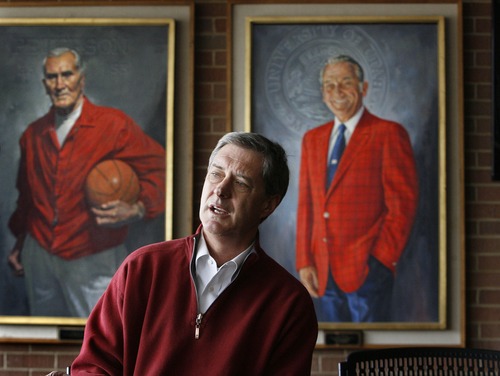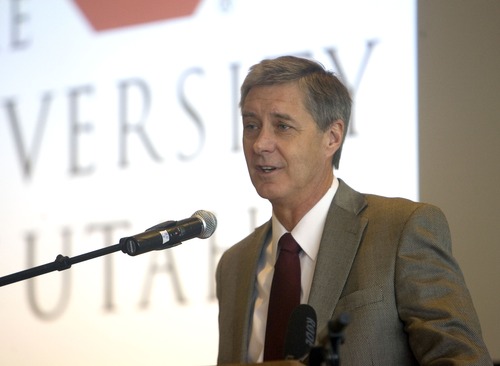This is an archived article that was published on sltrib.com in 2014, and information in the article may be outdated. It is provided only for personal research purposes and may not be reprinted.
Utah Athletic Director Chris Hill said Thursday that he supports consideration of an increased stipend for student-athletes and even potentially allowing them to pursue endorsement deals, but that on the whole he believes the current NCAA student-athlete model is "pretty successful."
Hill said he's still digesting Wednesday's National Labor Relations Board ruling that football players at Northwestern University can unionize, and that it's too early to say what the implications are, even for Northwestern.
Of himself and other athletic directors who have followed the case, Hill said, "Most all of us really don't fully understand what this ruling means, [or] fully understand what the players are asking for."
Only private universities are regulated by the labor board. In the ruling, NLRB Regional Director Peter Sung Ohr found that college football players at these schools meet the definition of employee: Coaches are their managers and scholarships are their compensation.
Therefore, as employees, they have a right to unionize.
Plaintiffs seeking the right to form what they have called the College Athletes Players Association cited, among other things, a desire to secure guaranteed medical expenses for former players. But the decision might also allow athletes at private universities to demand increased pay or sponsorships. Schools might have to pay minimum wage, and activities and gear might fall under Occupational Safety and Health Administration standards.
Utah junior wideout Kenneth Scott said after practice Thursday that employment status could be "a distraction."
"We don't need all that," Scott said. "We're just here to play ball. I don't see the benefit really, to be honest with you. … As long as my degree's getting paid for, I'm good."
David Murphy, a labor attorney with Dorsey & Whitney, said that if Northwestern's players vote to form a union, the school will likely appeal and the NLRB is likely to uphold the decision. From there a further challenge would go to directly to the federal appellate court.
Murphy said he also expects state and national legislators to begin proposing laws that exempt college athletic departments from NLRB oversight.
"In a state where college football is key and there's a lot of pressure on labor unions …, I can't imagine that's not going to happen," he said.
The most visible — and from the NCAA's standpoint, possibly the most potentially devastating — effort to secure compensation for college athletes was born in the Pac-12 Conference: O'Bannon v. NCAA.
In a federal antitrust class action lawsuit filed by former UCLA basketball player Ed O'Bannon, plaintiffs argue that student-athletes are entitled to financial compensation for the NCAA's use of their image.
If a jury rules in the plaintiffs' favor, athletes may be entitled to a large cut of television revenue and the entire system of college sports might be turned on its head. The case is scheduled for trial June 9.
Speaking broadly about whether student-athletes are fairly compensated for the countless hours many devote to sports — and for the money they generate for schools and conferences — Hill said.





